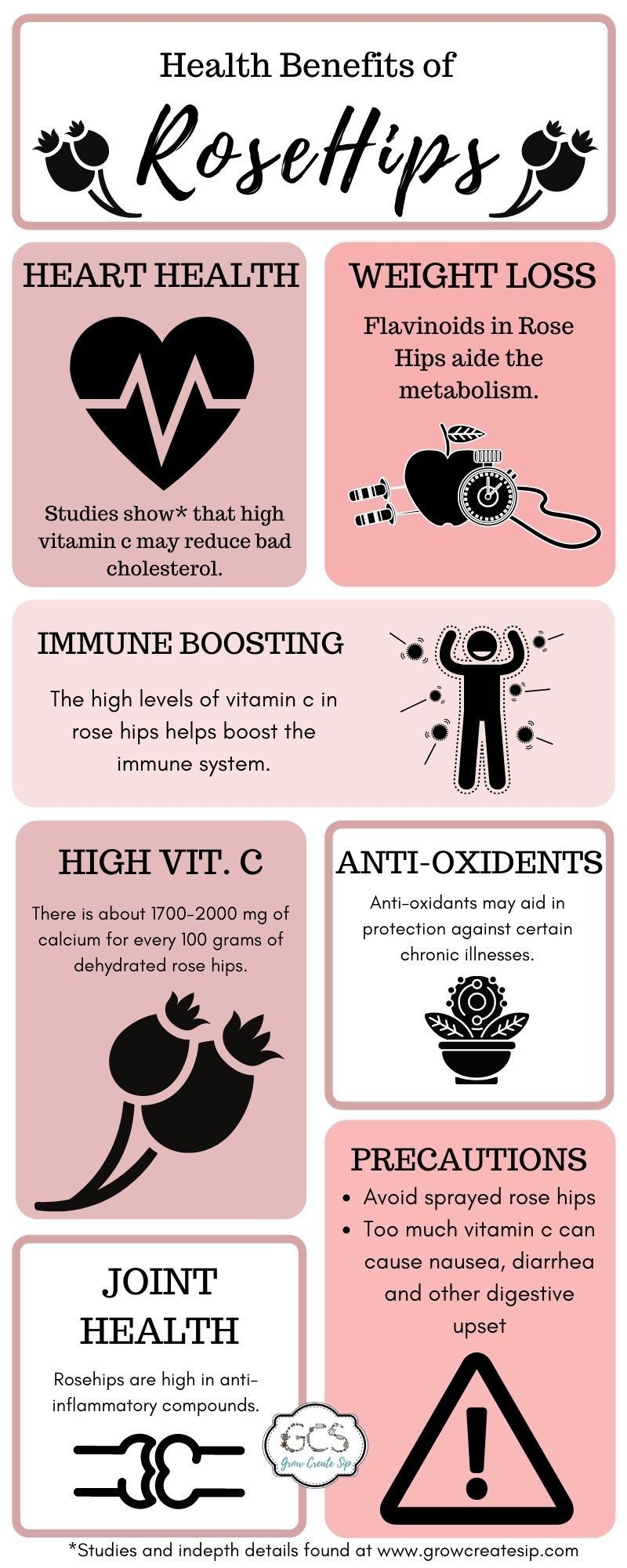
Contents
What Health Benefits Does Rosehip Have, and Are There Side Effects?
Rosehip, also known as rose hep or rose haw, is the edible fruit of the rose bush. It reduces inflammation, improves skin health, and may help heart health.
Rosehips are a traditional remedy for kidney stones, coughs and colds, and other ailments.
While there isn’t a lot of medical research on rosehip extracts or supplements, early studies show they might have benefits.
Rosehip is the edible fruit of the rose bush. There are many species of rose in the Rosa genus, but they all produce a small, berry-like fruit. These hips grow just below the flower and hold the plant seeds. They ripen in late summer or early fall after the roses have bloomed and have a red, orange-yellow, or burgundy color.
People have used rosehips as food and medicine for thousands of years, mainly for arthritis and gout. There are various rosehip supplements and products available today, including rosehip tea, seed oils, powdered dietary supplements, tinctures, and capsules. Rosehips are a popular ingredient in cosmetics, and their extracts and seed oils are often found in anti-aging products.
What is Rosehip Good For?
There are many health claims about rosehip supplements. The fruit might have some benefits, but more research is needed.
Rich in Vitamins and Nutrients
The rosehip fruit is rich in vitamins and nutrients. In one cup, or about 100 grams, of rosehips, you will find:
Rosehips are an excellent source of vitamin C, though its powders and dried products do not contain much. The extraction and drying process removes most of the vitamin C from rosehip supplements. If you want vitamin C, it’s better to eat fresh fruit instead.
The fresh hips are also rich in plant chemicals that help fight disease. These include quercetin, which lowers inflammation, and carotenoids like lycopene, lutein, and zeaxanthin that promote eye health.
Lowers Inflammation
Rosehips also contain a plant chemical called galactolipid, which can help lower inflammation. Studies have shown that rosehip powder can block pro-inflammatory enzymes, lower inflammatory chemical levels, and decrease C-reactive protein levels associated with inflammation.
These fruits also contain a mixture of acids (ursolic acid, oleanolic acid, and betulinic acid) that reduce inflammatory chemicals in the body. Vitamin C and E, along with quercetin and carotenoids, also help neutralize unstable molecules that damage cells and cause inflammation.
Promotes Healthy Skin
Rosehip seed oil is often praised for good skin health due to its vitamin C content, but it actually contains a mix of fatty acids, fats, carotenoids, and vitamin E. Vitamin C is found in the fruit, not the seeds.
Rosehips still benefit the skin, though. The oil is moisturizing, has regenerative and anti-aging properties, and may help treat skin conditions like acne, burns, and eczema.
Rosehip powder supplements may also improve skin elasticity, hydration, and wrinkles. A small study found that patients who took rosehip powder orally had improved skin texture and increased skin elasticity and hydration.
Rosehip oil might also promote wound healing, as studies show that it speeds up the healing process and may prevent scarring.
Might Help Heart Health
Rosehip extracts may help lower cholesterol and blood fat levels. Too much cholesterol and fat in the blood can lead to heart disease.
In animal studies, high doses of rosehip extract significantly lowered blood fat levels. Another study showed that rosehip extract could decrease cholesterol release from the liver.
There have been positive results in human studies as well. A rosehip powder drink given to patients led to significant improvements in blood pressure, total cholesterol, and cholesterol ratio, reducing the risk of heart disease.
Might Help with Fat Loss
Daily rosehip supplements may assist with weight loss. In a small study, overweight patients who took a rosehip extract tablet had lower BMIs and a lower body fat percentage compared to those who didn’t take the supplement.
A chemical in rosehip called tiliroside might help break down fat and suppress weight gain.
Might Treat Arthritis Pain
Rosehip is known for easing joint pain and stiffness. Several studies suggest that rosehip can help reduce osteoarthritis pain scores more effectively than a placebo. However, further research is needed as those studies were funded by the supplement manufacturer.
Side Effects of Rosehip
Rosehips are generally safe to eat, and rosehip supplements have very few side effects.
Eating excessive amounts of fresh rosehips might cause diarrhea, vomiting, and gas due to the high vitamin C content. While supplements have less vitamin C, they may still contain some.
Taking high doses of vitamin C supplements can cause digestive issues and potentially lead to kidney stones.
Bottom Line: Rosehips are a Healthy Fruit
While more research is needed on rosehip supplements, incorporating this fruit into your diet could be beneficial. Rosehips can be quite tart, so they’re best cooked or steeped as tea.
Consult your doctor before considering rosehip supplements.
QUESTION
These articles offer further research on rosehip and related topics:
Clinical Interventions in Aging: "The effectiveness of a standardized rose hip powder, containing seeds and shells of Rosa canina, on cell longevity, skin wrinkles, moisture, and elasticity."
Current Molecular Pharmacology: "Anti-Inflammatory and Analgesic Effects of Rosehip in Inflammatory Musculoskeletal Disorders and Its Active Molecules."
Current Pharmaceutical Design: "Phytochemistry, Traditional Uses and Pharmacological Profile of Rose Hip: A Review."
Diabetes, Metabolic Syndrome and Obesity: Targets and Therapy: "Daily intake of rosehip extract decreases abdominal visceral fat in preobese subjects: a randomized, double-blind, placebo-controlled clinical trial."
European Journal of Clinical Nutrition: "Effects of rose hip intake on risk markers of type 2 diabetes and cardiovascular disease: a randomized, double-blind, cross-over investigation in obese persons."
International Journal of Molecular Sciences: "Therapeutic Applications of Rose Hips from Different Rosa Species."
Iowa State University: "Roses have tips too!"
Journal of New Results in Science: "Fatty acids from waste rosehip seed: chemical characterization by GC-MS."
Mayo Clinic: "Is it possible to take too much vitamin C?"
Oregon State University: "Carotenoids."
Osteoarthritis and Cartilage: "Does the hip powder of Rosa canina (rosehip) reduce pain in osteoarthritis patients?–a meta-analysis of randomized controlled trials."
Planta Medica: "Rosehip Oil Promotes Excisional Wound Healing by Accelerating the Phenotypic Transition of Macrophages."
Plants: "Changes in Fatty Acids Content in Organic Rosehip (Rosa spp.) Seeds during Ripening."
University of Michigan University Health Service: "Blood Cholesterol, Blood Lipids and Heart Health."
U.S. Department of Agriculture FoodData Central: "Rose Hips, wild (Northern Plains Indians)."
U.S. National Library of Medicine MedlinePlus: "Rose Hip."


